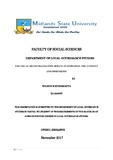Please use this identifier to cite or link to this item:
https://cris.library.msu.ac.zw//handle/11408/2975| Title: | The fiscal decentralisation debate in Zimbabwe: the context and dimensions | Authors: | Musamadya, Wilson K. | Keywords: | Fiscal autonomy Finance Zimbabwe |
Issue Date: | 2017 | Publisher: | Midlands State University | Abstract: | The thrust of this research is to interrogate the contentious issues surrounding the lack of fiscal autonomy and to analyse the effectiveness of the legal provisions as they relate to the characteristics of local government financing, assessing the extent to which Zimbabwe has strengthened the fiscal capacity of local authorities and systems of subnational government finances. Fiscal decentralisation is the transfer of taxing and spending powers from central government to local governments. Fiscal decentralisation has become the new development mantra being perceived as the panacea ameliorating a wide range of challenges associated with centralised provision of services. The study will also discuss the virtues and vices of fiscal decentralisation. The study analyses the Resource Dependency Theory (RDT) and its applicability in the Zimbabwean context Empirical evidence will be drawn from South Africa, India and the Philippines. The research used an exploratory research design that is qualitative in nature. Purposive sampling was used and key informant interviews were conducted during data gathering. The research revealed that the legal framework does not provide for the formular for intergovernmental fiscal transfers and that vertical and horizontal fiscal imbalances keep on growing. For fiscal decentralisation to be practically applicable, there is a need to strike a balance between expanding local authorities’ devolved fiscal autonomy and reducing central government’s powers and control of local authorities. To strike this balance, the perceived benefits of fiscal decentralisation need to be carefully weighed against its potential risks. The legal, political and economic environment prevailing in Zimbabwe and most developing countries is not conducive for fiscal decentralisation to effectively take place. Fiscal performance in local authorities can be enhanced by making sure that expenditure mandates match financial resources. This will avoid the problem of unfunded mandates. | URI: | http://hdl.handle.net/11408/2975 |
| Appears in Collections: | Bsc Local Governance Studies Honours Degree |
Files in This Item:
| File | Description | Size | Format | |
|---|---|---|---|---|
| FIRST DRAFT WILSON.pdf | Full Text | 2.51 MB | Adobe PDF |  View/Open |
Page view(s)
174
checked on Feb 14, 2026
Download(s)
102
checked on Feb 14, 2026
Google ScholarTM
Check
Items in MSUIR are protected by copyright, with all rights reserved, unless otherwise indicated.



